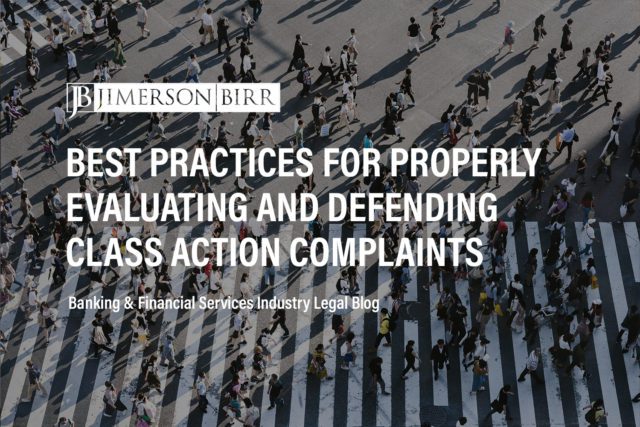What does consolidating and transferring multiple class action filings into multidistrict litigation entail?
Consolidating and transferring multiple class action filings to the U.S. Panel on Multidistrict Litigation (MDL) involves streamlining the litigation process by centralizing similar cases before one judge rather than litigating them separately in various courts. This approach can save time and resources, prevent inconsistent rulings, and promote settlement negotiations. In the context of class action litigation defense in Florida, this strategy is sometimes preferable over opposing the class action format. In addition, by transferring cases to the MDL, parties can focus on resolving common issues and avoid duplicative discovery efforts.
For instance, a company facing multiple class actions related to defective products might opt for consolidation under the MDL rather than fighting each case individually in different courts. Another example involves claims of securities fraud where multiple investors allege similar misconduct by the defendant. Again, consolidating these cases can lead to a more efficient resolution and benefit all parties involved.
Need help considering multidistrict litigation? Schedule your consultation today with a top class action defense attorney.
Which Florida and federal laws and regulations apply to consolidating and transferring multiple class action filings?
The U.S. Panel on Multidistrict Litigation follows federal law, specifically 28 U.S.C. § 1407, which provides the statutory framework for transferring and consolidating cases before the MDL panel. In Florida, state-level class actions follow Florida Rule of Civil Procedure 1.220, which outlines the criteria for certifying a class action and guides the court’s discretion in managing these cases. However, Florida state laws and regulations are not directly applicable to the MDL process, as the MDL panel operates under federal jurisdiction.
While no specific Florida laws dictate when or how to transfer cases to the MDL panel, defendants in Florida should be familiar with both the federal MDL statute and Florida’s class action rules to choose a practical course of action. Knowing the intricacies of both legal frameworks can help determine when it is appropriate to seek MDL consolidation or oppose class action certification in Florida.
What are the strategic benefits of consolidating and transferring multiple class action filings?
Consolidating and transferring multiple class action filings to the U.S. Panel on Multidistrict Litigation when appropriate, rather than opposing a class action format, offers the following strategic benefits:
- Efficiency: Centralizing similar cases in one federal court streamlines pretrial proceedings and avoids duplicative discovery and motion practice, saving time and resources for all parties involved.
- Consistency: By consolidating cases with common issues of fact, the risk of inconsistent rulings across different jurisdictions is lower, which benefits both plaintiffs and defendants.
- Cost reduction: Transferring multiple class action filings to the MDL panel can lead to a more cost-effective litigation process for defendants, as they can better coordinate their defense strategies and share the burden of discovery and other pretrial expenses.
- Settlement facilitation: Consolidated cases in the MDL process often encourage settlement discussions, as parties can evaluate the strengths and weaknesses of their positions based on the progress of the consolidated cases, potentially leading to earlier and more favorable settlements for defendants.
- Preservation of individual trials: The MDL process preserves the parties’ rights to individual trials if necessary. This preservation can give an edge to defendants, as they can still address the unique circumstances of each case and avoid the risks associated with consolidation.
- Greater control over litigation strategy: Defendants in MDL proceedings often have more control over their strategy than in class actions. They can negotiate with the plaintiffs’ steering committee, which represents the interests of all plaintiffs and may have a better opportunity to shape the outcome of the litigation.
What steps should a class action defendant take to consolidate and transfer multiple class action filings, and how will class action plaintiffs generally respond?
Class action defendants should follow these steps:
- Assess the cases: Review the facts and legal issues in each class action filing. Determine whether the cases share common questions of fact, a prerequisite for consolidation and transfer to the U.S. Panel on Multidistrict Litigation.
- Consult with legal counsel: Engage an attorney experienced in class action defense and MDL proceedings to advise on consolidation and transfer’s feasibility and strategic advantages.
- File a motion: If consolidation and transfer are deemed appropriate, file a motion with the proper federal court requesting that the cases be consolidated and transferred to the MDL Panel. Provide a well-reasoned argument demonstrating that consolidation and transfer would promote judicial efficiency and serve the interests of justice.
- Attend the MDL hearing: Participate in the MDL Panel hearing, where the Panel will decide whether to grant the motion for consolidation and transfer. Present compelling arguments in favor of consolidation and transfer.
Class action plaintiffs generally respond to consolidation and transfer efforts by:
- Opposing the motion: Plaintiffs may argue that their cases are unique and that consolidation and transfer would not promote judicial efficiency or serve the interests of justice. They may also raise jurisdictional issues, or claim consolidation would prejudice their ability to pursue individual claims.
- Proposing alternative venues: In some instances, plaintiffs may agree that consolidation is appropriate but suggest a different venue or judge oversee the consolidated proceedings.
When a set of facts is appropriate to meet the requirements of MDL, there are many paths a claimant may take. We are value-based attorneys at Jimerson Birr, which means we look at each action with our clients from the point of view of costs and benefits while reducing liability. Then, based on our client’s objectives, we chart a path to seek appropriate remedies.
To determine whether a unique situation may necessitate litigation, please contact our office to set up your initial consultation.
Frequently Asked Questions
- What is the U.S. Panel on Multidistrict Litigation, and what is its role in class action litigation?
The U.S. Panel on Multidistrict Litigation is a panel of seven federal judges appointed by the Chief Justice of the United States. The MDL Panel’s primary role is determining whether civil actions pending in different federal districts should be consolidated and transferred to a single district for coordinated pretrial proceedings, promoting judicial efficiency and conserving resources.
2. Can state court class actions be consolidated and transferred to the MDL Panel?
No, the MDL Panel only has jurisdiction over cases filed in federal court. However, state court cases may be removed to federal court under certain circumstances, such as when the parties are citizens of different states, and the amount in controversy exceeds $75,000. Once in federal court, these cases may become eligible for consolidation and transfer to the MDL Panel.
3. How does the consolidation and transfer process impact the overall timeline of a class action lawsuit?
Consolidation and transfer can streamline the pretrial process by allowing for coordinated discovery, motion practice, and pretrial rulings. These efficiencies can help reduce duplicative efforts and speed up the litigation process. However, the realized impact on the timeline may vary depending on the complexity of the cases, the size of the consolidated proceedings, and the efficiency of the presiding judge.
Have more questions about a multidistrict litigation-related situation?
Crucially, this overview of consolidating and transferring multiple class action filings to the U.S. panel on multidistrict litigation does not begin to cover all the laws implicated by this issue or the factors that may compel the application of such laws. Every case is unique, and the laws can produce different outcomes depending on the individual circumstances.
Jimerson Birr attorneys guide our clients to help make informed decisions while ensuring their rights are respected and protected. Our lawyers are highly trained and experienced in the nuances of the law, so they can accurately interpret statutes and case law and holistically prepare individuals or companies for their legal endeavors. Through this intense personal investment and advocacy, our lawyers will help resolve the issue’s complicated legal problems efficiently and effectively.
Having a Jimerson Birr attorney on your side means securing a team of seasoned, multi-dimensional, cross-functional legal professionals. Whether it is a transaction, an operational issue, a regulatory challenge, or a contested legal predicament that may require court intervention, we remain a tireless advocate every step of the way. Being a value-added law firm means putting the client at the forefront of everything we do. We use our experience to help our clients navigate even the most complex problems and come out the other side triumphant.
If you want to understand your case, the merits of your claim or defense, potential monetary awards, or the amount of exposure you face, you should speak with a qualified Jimerson Birr lawyer. Our experienced team of attorneys is here to help. Call Jimerson Birr at (904) 389-0050 or use the contact form to schedule a consultation.

We live by our 7 Superior Service Commitments
- Conferring Client-Defined Value
- Efficient and Cost-Effective
- Accessibility
- Delivering an Experience While Delivering Results
- Meaningful and Enduring Partnership
- Exceptional Communication Based Upon Listening
- Accountability to Goals










